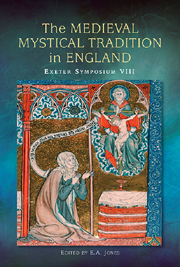 The Medieval Mystical Tradition in England
The Medieval Mystical Tradition in England Book contents
- Frontmatter
- Contents
- Lists of Diagrams and Figures
- List of Contributors
- Abbreviations
- Introduction
- The Colours of Contemplation: Less Light on Julian of Norwich
- Behold Not the Cloud of Experience
- Walter Hilton on the Gift of Interpretation of Scripture
- Numeracy and Number in The Book of Margery Kempe
- Religious Mystical Mothers: Margery Kempe and Caterina Benincasa
- Authority and Exemplarity in Henry Suso and Richard Rolle
- Mortifying the Mind: Asceticism, Mysticism and Oxford, Bodleian Library, MS Douce 114
- The Meditaciones of the Monk of Farne
- Envisioning Reform: A Revelation of Purgatory and Anchoritic Compassioun in the Later Middle Ages
- Walton's Heavenly Boece and the Devout Translation of Transcendence: O Qui Perpetua Pietised
- Reformist Devotional Reading: The Pore Caitif in British Library, MS Harley 2322
- Richard Whytford, The Golden Epistle, and the Mixed Life Audience
- Afterword: Future Prospects
- Index
Afterword: Future Prospects
Published online by Cambridge University Press: 05 July 2013
- Frontmatter
- Contents
- Lists of Diagrams and Figures
- List of Contributors
- Abbreviations
- Introduction
- The Colours of Contemplation: Less Light on Julian of Norwich
- Behold Not the Cloud of Experience
- Walter Hilton on the Gift of Interpretation of Scripture
- Numeracy and Number in The Book of Margery Kempe
- Religious Mystical Mothers: Margery Kempe and Caterina Benincasa
- Authority and Exemplarity in Henry Suso and Richard Rolle
- Mortifying the Mind: Asceticism, Mysticism and Oxford, Bodleian Library, MS Douce 114
- The Meditaciones of the Monk of Farne
- Envisioning Reform: A Revelation of Purgatory and Anchoritic Compassioun in the Later Middle Ages
- Walton's Heavenly Boece and the Devout Translation of Transcendence: O Qui Perpetua Pietised
- Reformist Devotional Reading: The Pore Caitif in British Library, MS Harley 2322
- Richard Whytford, The Golden Epistle, and the Mixed Life Audience
- Afterword: Future Prospects
- Index
Summary
THE SYMPOSIUM also received brief reports on some work in progress. Barbara Zimbalist (University of California Davis) is developing an argument that, through the representation of Christ's apocryphal speech in the vernacular, women's visionary texts reflect a growing desire for access to the Word of God among lay readers. Through the development of Christ's voice as a mode of devotional discourse, women's visionary texts make a distinct contribution to the increasingly varied modes of vernacular devotion, and offer readers opportunity for textual processes of imitatio Christi founded on Christ's identity as speaker and evangelist - an alternative to the more widely acknowledged tradition of passion-based, corporeally realised modes of affective piety offen attributed to women. By reading the long tradition of Christ's extra-biblical speech as texts that evoked specific interpretative hermeneutics, she is arguing for a more nuanced understanding of vernacular devotion within late-medieval literacy and a more inclusive view of the varied textual traditions - including women's visionary texts - that contributed to the changing literary landscape of vernacular devotional in the later Middle Ages.
Laura Kalas Williams (University of Exeter) is working on a project examining conceptualisations of pain in the writings of Bridget of Sweden and Margery Kempe and their relationship with paradigms of physiology and illness in medieval medical writing. Noting that the internal, esoteric and ineffable qualities of both physical pain and visionary experience mark an ontological correlation that has received surprisingly little scholarly attention, Williams is conducting the first detailed examination of maternalised pain in these texts, with a particular consideration of the perception of surrogate or adoptive pain.
- Type
- Chapter
- Information
- The Medieval Mystical Tradition in EnglandPapers Read at Charney Manor, July 2011 [Exeter Symposium 8], pp. 209 - 210Publisher: Boydell & BrewerPrint publication year: 2013


